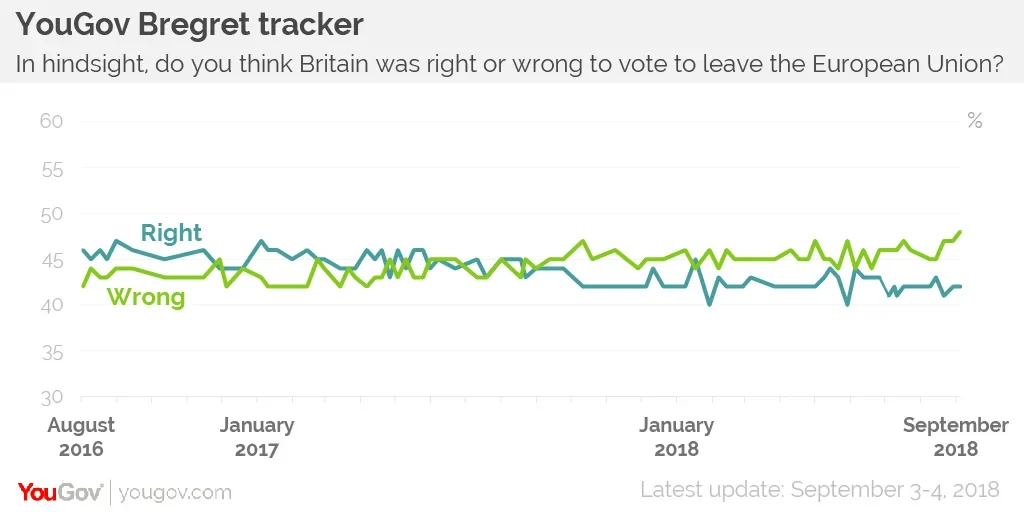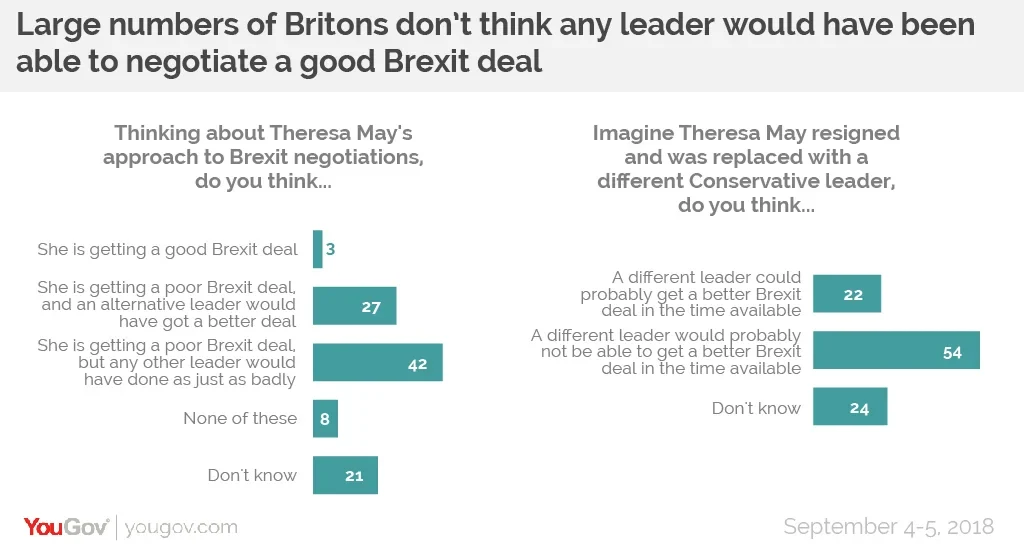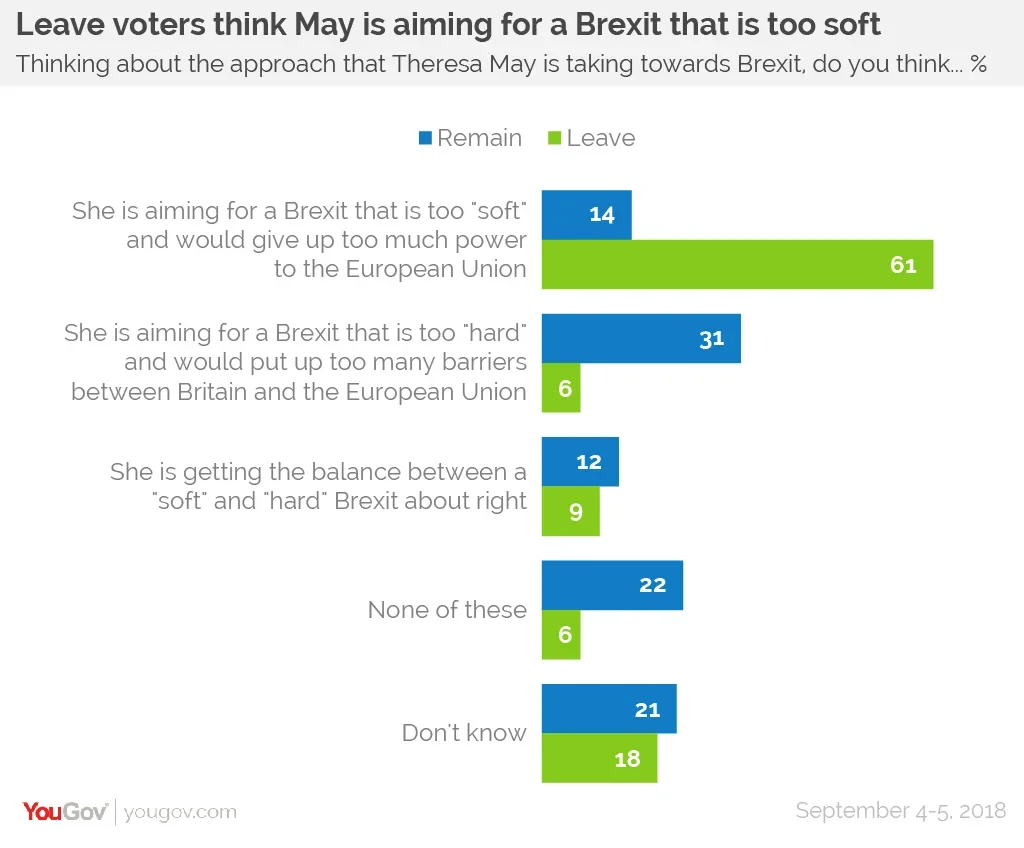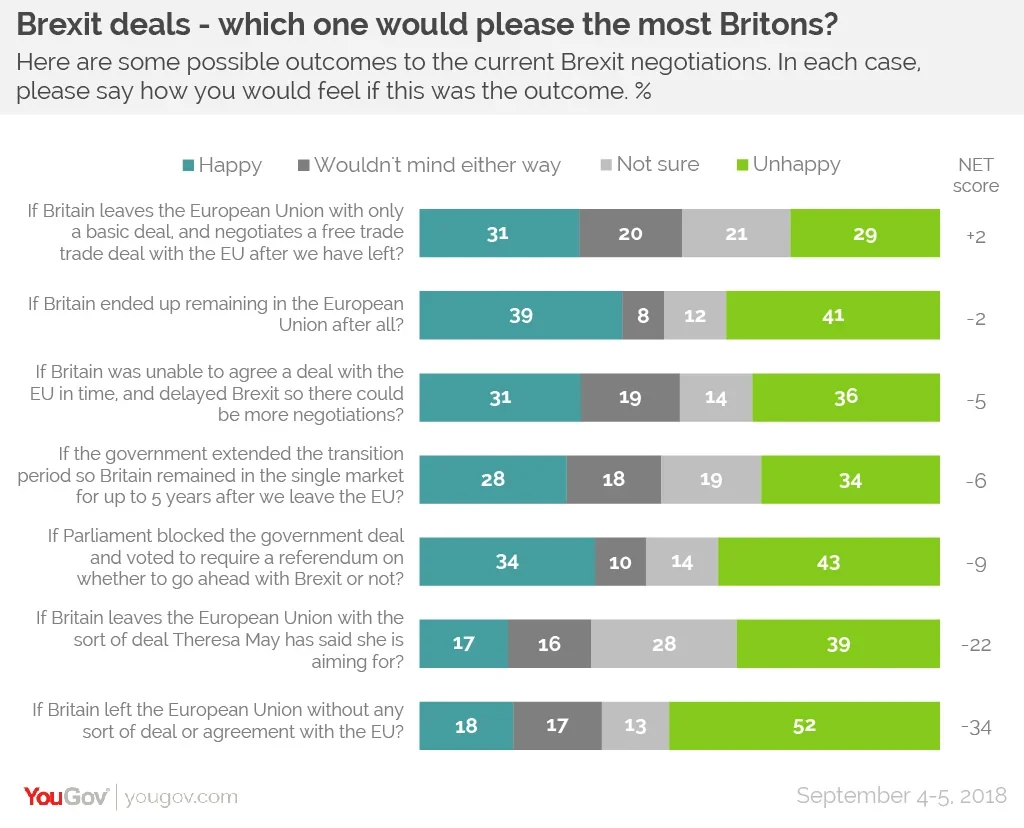With close to 6 months left until Brexit, YouGov checks in on where public opinion stands
As we head towards the final months of the Brexit process hard choices will soon have to be made, some of which may go down very badly with the public.
Many different pressure groups, campaign organisations, and internal Conservative factions are pushing for different outcomes. These include delaying Brexit, going with May’s proposed deal, leaving with a skeleton deal with the details being sorted out at a later date, leaving without a deal, or to having a fresh referendum and possibly remaining in the EU after all.
We’ve tested where public opinion stands on Brexit as we head into the autumn.
Bregret
Overall public opinion has drifted slightly against Brexit. We regularly ask the public whether they think that Britain was right or wrong to vote to leave and the answers now show that slightly more people think it was the wrong decision. The gap is still relatively small (on average this year “wrong” has had a three-point lead over “right”), but it is consistent.

Negotiations
There is an overwhelming perception that the Brexit negotiations are not turning out well. In our most recent tracker 73% of the public thought the negations were going badly, including majorities of both Remainers and Leavers, and both Tory and Labour supporters. Only 22% of people now think that it is likely that a deal will be struck in time for Britain to leave the EU in March 2019.
A majority (55%) think that the EU has had the upper hand in negotiations, around a quarter (24%) think there has been give-and-take on both sides and just 2% think the UK seems to have the advantage. Only 8% of people expect the government to get the sort of Brexit they have said they want – while approaching three in ten (28%) expect them to end up agreeing a deal for a softer Brexit than they want, and around the same proportion (27%) expect no deal at all.
However, these deeply negative judgements are not placed wholly at Theresa May’s door. Four in ten (42%) respondents think that any other leader would have done just as badly as May, compared to just over a quarter (27%) who believe someone else could have done better.
Neither is the perceived poor progress of negotiations necessarily seen as a reason to replace May. Just over one in five (22%) people now think an alternative leader would get a better Brexit deal, while over half (54%) think that a different leader would not be able to do any better in the time available.

Chequers
The specifics of the Chequers agreement are not something that has cut through to the public. Over two-thirds (69%) say they have either not been following the story or are unaware of it. Four in ten (40%) think that the sort of Brexit deal laid out at Chequers would be bad for Britain, compared to just one in nine (11%) who believe it would be good. However, around half (49%) don’t know. Understandably enough, a large proportion of people aren’t following the fine detail of the Brexit saga.
Perhaps a better illustration of the public’s mood is to ask about broad perceptions rather than the detailed proposals. Asked about Theresa May’s approach to the negotiations, one in three (34%) think she is aiming for a Brexit that is “too soft” (that is, gives too much power to the EU), as opposed to 18% who reckon she is going for a Brexit that is “too hard” (that is, puts up too many barriers between Britain and the EU). Just 11% think she has the balance about right. Well over a third (38%) agree with none of these (these are largely Remain voters who, presumably, would rather we weren’t leaving at all).
Among those who voted to Leave in 2016 the picture is starker. Six in ten (61%) of them think May is aiming for a Brexit that is too soft, and fewer than one in ten (9%) reckon she is getting the balance about right. Whether or not people are following the fine details of the negotiations with Brussels or indeed those within the Conservative party, is does seem as if Leave voters believe May is aiming for too soft a Brexit.

Outcomes
Finally we asked how people would respond to some of the possible ways Brexit could proceed over the next few months.

A basic agreement, followed by an EU free trade deal later on was the most positively rated outcome (31% would be happy, 29% unhappy). However, this assumes a free trade deal is eventually achieved and people may be less happy to leave with only a basic deal when the future is still unknown. The second most popular proposal was if Britain decided to stay after all (39% happy, 41% unhappy.
The other suggested ways of getting through the next few years were all less popular. By 43% to 34% people would be unhappy if Parliament rejected the deal and insisted on a referendum about whether to go ahead. This idea gets less support than our regular tracker on whether people think there should be a referendum, suggesting that the process by which one was triggered would make a difference.
The idea of delaying Brexit to allow for a better deal also scored badly. By 34% to 28% people are unhappy with the idea of extending the post-Brexit transition period to five years. Furthermore are unhappy with delaying the departure date itself to allow time for more negotiations (36% to 31%).
While these outcomes scored negatively, they are still viewed less negatively than Britain actually going ahead with Theresa May’s intended deal (17% happy, 39% unhappy) or, most negatively of all, leaving without a deal (18% happy, 52% unhappy).
Photo: Getty









